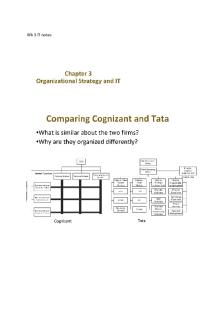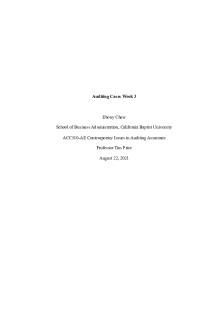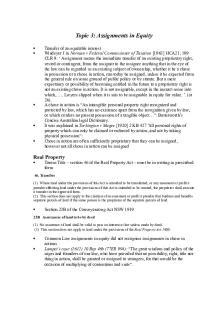(Wk. 3) Concerted Cultivation & Natural Growth PDF

| Title | (Wk. 3) Concerted Cultivation & Natural Growth |
|---|---|
| Author | James Smythe |
| Course | Developing Understandings Of Inclusive Literacy And Numeracy |
| Institution | University of Strathclyde |
| Pages | 3 |
| File Size | 59.2 KB |
| File Type | |
| Total Views | 134 |
Summary
Group/Buddy reading task...
Description
X3472 – ‘Ch.1 “Concerted cultivation and Natural Growth” Lareau, A. (2011). Unequal childhoods: Class, race, and family life. Univ of California Press.’ Concerted cultivation is a style of parenting. This parenting style/practice is marked by a parent's attempts to foster their child's talents by incorporating organized activities in their children's lives Predominantly engaged by middle class families Both working & middle-class families want the best for their children but due to formidable economic constraints, working class families do not consider the concerted development of their children Working class children are therefore accomplish natural growth (less organised activities)
In the accomplishment of natural growth, working class children experience long stretches of leisure time, child-initiated play, clear boundaries between adults and children, and daily interactions with kin. Parenting guidelines typically stress the importance of reasoning with children & teaching them to solve problems through negotiation rather than with physical force Professionals who work with children generally agree about how children should be raised but disagree on the ways standards should be enacted e.g. talking with children & developing their educational interests These practices from a ‘dominant set of cultural repertoires’ Middle class children exhibit a ‘sense of entitlement’ characteristic’
Americans are much more comfortable recognizing the power of individual initiative than recognizing the power of social class. One of the best predictors of whether a child will one day graduate from college is whether his or her parents are college graduates.
Study:
-
Based on intensive “naturalistic” observations of twelve families (six white, five Black, and one interracial) with children nine and ten years old.
-
Followed children and parents as they went through their daily routines, as they took part in school activities, church services and events, organized play, kin visits, and medical appointments.
-
In the house, the study supervisors sat on the floor with children and, as a rule, insisted on sitting in the backseat of cars when they rode along on family outings.
Findings: Middle-class children, especially, spent quite a bit of time waiting for adults. Delight in the study was clearly stronger in the working-class and poor families, possibly because it was rare for these children to meet adults outside of their extended family, neighbours, and teachers. In middle-class families, children routinely interacted with nonfamilial adults outside of the home environment or school.
Summary: It is a mistake to accept, carte blanche, the views of officials in dominant institutions (e.g., schools or social service agencies) regarding how children should be raised
In a society less dominated by individualism than the United States, with more of an emphasis on the group, the sense of constraint displayed by working-class and poor children might be interpreted as healthy and appropriate. But in this society, the strategies of the working-class and poor families are generally denigrated and seen as unhelpful or even harmful to children’s life chances. The benefits that accrue to middle-class children can be significant, but they are often invisible to them and to others....
Similar Free PDFs

WK 3 - wk 3 summary
- 5 Pages

Wk 3 Apply - Assingment
- 3 Pages

Natural Science Paper 3
- 5 Pages

Wk 3 notes MBA 610
- 13 Pages

Wound Care Notes Wk 3
- 14 Pages

WK 3 Assignment 1 - ggjg
- 29 Pages

Auditing Case 3 Wk 3 - Grade: A+
- 4 Pages

Wk 3 Assignments in Equity
- 6 Pages

Chapter 29 Cultivation Theory
- 2 Pages

Natural science unit 3 exam
- 57 Pages

Lab 3 Natural Selection (Online)
- 26 Pages
Popular Institutions
- Tinajero National High School - Annex
- Politeknik Caltex Riau
- Yokohama City University
- SGT University
- University of Al-Qadisiyah
- Divine Word College of Vigan
- Techniek College Rotterdam
- Universidade de Santiago
- Universiti Teknologi MARA Cawangan Johor Kampus Pasir Gudang
- Poltekkes Kemenkes Yogyakarta
- Baguio City National High School
- Colegio san marcos
- preparatoria uno
- Centro de Bachillerato Tecnológico Industrial y de Servicios No. 107
- Dalian Maritime University
- Quang Trung Secondary School
- Colegio Tecnológico en Informática
- Corporación Regional de Educación Superior
- Grupo CEDVA
- Dar Al Uloom University
- Centro de Estudios Preuniversitarios de la Universidad Nacional de Ingeniería
- 上智大学
- Aakash International School, Nuna Majara
- San Felipe Neri Catholic School
- Kang Chiao International School - New Taipei City
- Misamis Occidental National High School
- Institución Educativa Escuela Normal Juan Ladrilleros
- Kolehiyo ng Pantukan
- Batanes State College
- Instituto Continental
- Sekolah Menengah Kejuruan Kesehatan Kaltara (Tarakan)
- Colegio de La Inmaculada Concepcion - Cebu




